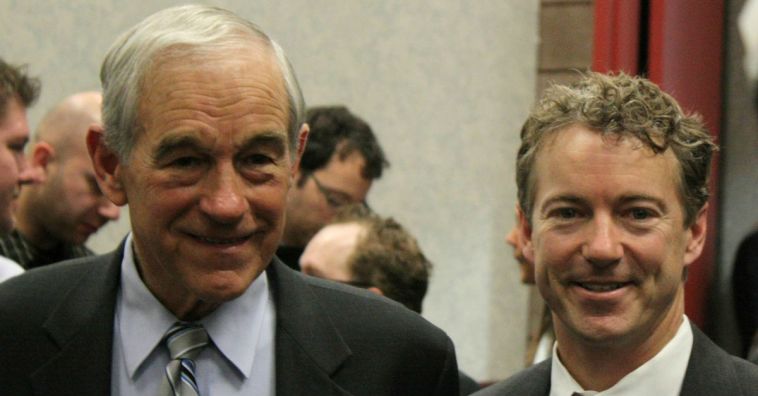Former Rep. Ron Paul is best-known for his staunch libertarian ideas. The Texas Republican promoted these vigorously during his three presidential bids and 23 years in Congress.
Videos By Rare
One of Paul’s sons, Sen. Rand Paul, is a leading contender for the 2016 Republican presidential nomination. The Kentucky lawmaker, first elected in 2010, shares his father’s deep opposition to federal power, and has helped shape the debate his way on foreign policy, skepticism of the Federal Reserve and a range of other issues.
But one under-appreciated area in which the Pauls have moved the political needle is in language and rhetoric. These libertarian-leaning Republicans have – directly and tangentially – come to represent key terms of political discourse Chuck McCutcheon and I write about in our new book, Dog Whistles, Walk-Backs and Washington Handshakes: Decoding the Jargon, Slang and Bluster of American Political Speech.
The book, published by ForeEdge, decodes what politicians really mean when they use odd-sounding, insider-ish phrases.
Consider “Non-Apology Apology” a longstanding political tactic that applies to the recent plight of Jesse Benton, who had been Sen. Mitch McConnell’s campaign manager. Benton recently resigned from his post with the Kentucky Republican’s campaign, following reports that he had emerged as a figure in an endorsement scandal during the 2012 Iowa presidential caucus.
“In an emailed statement Friday evening, Benton denied any involvement in the scandal, in which Iowa state Sen. Kent Sorenson admitted receiving payments from U.S. Rep. Ron Paul’s campaign before switching his endorsement to the congressman,” reported the Louisville Courier-Journal. “He had previously backed U.S. Rep. Michele Bachmann.”
In a statement Benton tried to put a positive spin on the situation. “I hope those who know me recognize that I strive to be a man of integrity,” Benton said. “What is most troubling to me is that they risk unfairly undermining and becoming a distraction to this reelection campaign.… I cannot, and will not, allow any possibility that my circumstances will affect the voters’ ability to hear [McConnell’s] message and assess his record. This election is far too important and the stakes way too high.”
That’s a classic way of making an action seems selfless and chivalrous, without admitting any guilt. After all, giving up a top post with the new Senate majority leader is not a step usually taken voluntarily.
And while Sen. Rand Paul is on the periphery of that political term-of-art, former Rep. Ron Paul is directly responsible for some other well-known phrases. Paul is particularly associated with “Money Bomb” – which we describe as “an online fundraising technique of recent origin to pull in a lot of campaign cash in a short period to maximize publicity.”
“The unconventional strategy goes completely against the grain of the big-dollar donor dinners most candidates favor; it combines web-based fundraising appeals (that’s the ‘bomb’ part of it) with traditional fundraising methods.
“The term was first used to pull in campaign cash for the 2008 Republican presidential bid of Texas representative Ron Paul. As Paul’s campaign showed, it works best when appealing to a broad range of people who are extremely passionate about a cause or candidate, who can only contribute a small amount of money, but who are all too eager to spread the word via Facebook, and Twitter. Paul pulled in $4.2 million in one day, making it at that time the largest one-day Internet political fundraiser ever. That kind of money causes political professionals and the media to sit up and take notice.”
Both Pauls have been known to push what political scientists call the Overton Window – the acceptable center of gravity of discussion. As Dog Whistles recounts, it’s “a term that refers to the acceptable range of public discourse. It is named for Joseph Overton, who developed the idea at Michigan’s Mackinac Center for Public Policy in the mid-1990s.”
“Those who step out of the Overton window are deemed outliers who aren’t part of the mainstream. For liberals, this includes advocates of a single-payer health care system. For conservatives, it’s those who want to abolish the IRS or replace the income tax with a national sales tax.”
Ron Paul, and now Rand Paul, have made an art form of maneuvering outside the Overton window. Ron Paul, for instance, was decades ahead of tea party types in questioning the very existence of the Federal Reserve. And Sen. Rand Paul advocates eventually cutting off all foreign aid – an idea anathema to most Democrats and Republicans but perhaps simply ahead of its time.
Mark’s new book with co-author Chuck McCutcheon, Dog Whistles, Walk-Backs and Washington Handshakes: Decoding the Jargon, Slang and Bluster of American Political Speech, is out this week.

